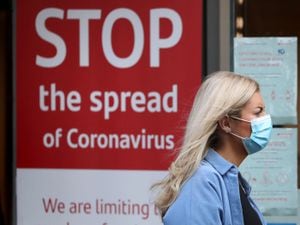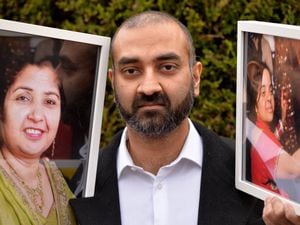Face mask rules from today as coverings become compulsory in shops and on transport
From tomorrow face masks will again be compulsory in shops and on public transport in England.

The reintroduction of the rule is part of the Government's response to the new Omicron variant. The new strand of Covid-19 is said to be more transmissible and have more mutations which could weaken the effect of vaccines and natural immunity.
Prime Minister Boris Johnson has said it appears Omicron spreads "very rapidly", and "can be spread between people who are double vaccinated".
"There is also a very extensive mutation which means it diverges quite significantly from previous configurations of the virus, and as a result it might at least in part reduce the protection of our vaccines over time."
As a result, "targeted and proportionate" measures are being brought in, which includes people having to cover their faces again.
The mandatory wearing of face coverings in these settings was initially dropped by the Government in July, though this only applied to England. The Welsh and Scottish Governments have maintained the rules which say masks must be warn in shops and on public transport.
Where must masks be worn?
In England face coverings will be compulsory on public transport and in shops from Tuesday, November 30.
A statement from the Goverment says: "From 4am Tuesday 30 November face coverings will be compulsory in shops and other settings such as banks, post offices and hairdressers, as well as on public transport unless individuals are exempt from doing so."
However, all hospitality settings - including pubs, restaurants and cafes - will remain exempt.
Both Labour and the the British Medical Association (BMA) have questioned that decision.
Experts at the BMA have said that staff in pubs and restaurants should be required to wear face coverings when serving customers, while Labour have called for the mask rules to include people at indoor hospitality venues.
Face masks in schools
Staff and secondary school pupils are now being "strongly advised" to cover their faces in communal areas (outside classrooms) at school from Monday.
Education Secretary Nadhim Zahawi has recommended that staff, visitors and pupils in Year 7 and above should wear masks in communal areas in schools, colleges and universities such as corridors, canteens and halls.
The measure covers all education establishments including universities, as well as childcare settings such as early years care.
Pupils or students (from Year 7 upwards) should also continue to wear face coverings on public and dedicated school transport, unless they are exempt, the Department for Education says.
Education Secretary Nadhim Zahawi said: "We are already taking targeted and proportionate action as a precaution while we find out more information about the new variant. As we do so, we will continue to prioritise children’s and young people’s education and wellbeing, making sure education and childcare settings are as safe as possible and children continue to benefit from classroom teaching."
The response has been described as "sensible" by the general secretary of the Association of School and College Leaders, Geoff Barton.
In Wales, staff, students and pupils at universities, colleges and secondary schoolhave been told they should now wear masks indoors.
The Welsh Government issued the guidance on Monday evening that where social distancing cannot be maintained, face coverings should be worn.
“This is a temporary, precautionary measure that will be in place for the remaining weeks of term at which point the position will be reviewed. This should come into effect in all settings as soon as possible,” Education minister Jeremy Miles MS
“With three weeks left of term, it is vital that we ensure that learning can continue for as many learners as possible,” he added.
The rule applies to all staff and learners in those settings, the minister said.
Although he noted many schools are already operating on this basis due to their own risk assessments.
Mr Miles said: “The emergence of this new variant is a serious development in the ongoing pandemic.
“We have already taken swift action on international travel, alongside the other UK governments. We are now introducing an additional measure, while we learn more about this new strain.
“There remains a lot we don’t know about this new variant. With this high level of uncertainty, it is right that we remain cautious while prioritising the continuation of education.
“It reinforces the need for everyone in Wales to get their vaccine or booster when offered, wear face coverings when necessary, and book a test if they develop symptoms.”
Mr Miles said he would be writing to all institutions on Wednesday to set out the new guidance.
What other measures are being brought in
PCR tests also return for those travelling into the country.
From 4am on Tuesday, anyone travelling from abroad must take a PCR test on or before day two, and self-isolate until they have received a negative test result. PCR tests must be purchased from private providers as free NHS tests are not valid for this purpose.
All close contacts of anyone who has tested positive for the Omicron variant must isolate for 10 days regardless of whether they have been vaccinated.
The Prime Minister has so far stopped short of bringing back the work-from-home guidance or extending the use of vaccine passports.
England’s chief medical officer, Professor Chris Whitty, also told Saturday's press conference that the Joint Committee on Vaccination and Immunisation (JCVI) will be tasked with looking at whether boosters can be extended from the over-40s to the over-18s.
They will also consider whether second doses should be offered to 12 to 15-year-olds, and whether the waiting time before a booster jab could be reduced.
When will rules be reviewed?
The measures - both for the compulsory wearing of masks in shops and on transport and the guidance for schools - will be reviewed in three weeks, which will be the weekend before Christmas on December 18/19.
Speaking on Saturday, Prime Minister Boris Johnson described the measures as a "precaution" and buy time for scientists while more is learned about the Omicron variant.





